Warren Adler's Blog, page 13
May 25, 2017
New Exclusive FORBES Two-Part Series on Warren Adler (Part II)
(This is the last in a two-part series on Warren Adler, his attitudes toward ageism and of the importance of never allowing oneself to lose the creative impulse in the face of aging or rejection. Part one can be found here.)
Nearing his ninetieth year, Warren Adler has shown he has staying power. The acclaimed author of the 1981 tumultuous divorce classic, The War of the Roses (which he adapted into a screenplay of the same name, and the 1989 film that starred Michael Douglas, Kathleen Turner and Danny DeVito), has since published more than 50 novels, plays, poems and essays, and more than a hundred short stories translated into 25 languages. He also claims ownership to fueling an unprecedented bidding war on a Hollywood commission for his book Private Lies which resulted in Hollywood’s largest payout at that time for an unpublished manuscript.
In 1950, a short story written by Adler was included in the book Which Grain Will Grow: Stories and Sketches of Childhood. The book was published by the Cambridge Publishing Company, through New School in New York, where Adler studied among the likes of Mario Puzo and William Styron.
Adler said the title of the book came from a quote from Shakespeare’s Macbeth, “If you can look into the seeds of time, and say which grain will grow and which will not, speak then to me.”
“Thirty-nine writers were featured,” Adler said. “To my knowledge, only one is still writing. Yours truly.”
Adler has a new message for older Americans. It is that they are relevant and, like him, can stay that way.
He said if he could tell his 20-year-old-self anything, it would be, “You were one dumb lucky bastard to stick with your dream all those years.”
Nevertheless, he is hoping young and old alike will consider themselves lucky and pursue their dreams mo matter their age.
The advice he said he would share with men and women in their 40s, 50s and 60s about getting older? “If you have a dream, take the risk and pursue it,” he said. “Above all, force yourself to be self-aware, tell yourself the truth about yourself and understand that you live in a limited time frame. And above all, be wary of following any advice, including from me.”
Adler, a passionate and outspoken advocate of aging with purpose, has written motivational pieces about his attitudes toward ageism and of the importance of never allowing oneself to lose the creative impulse in the face of aging or rejection. He’s written for PBS Next Avenue, Changingaging.org and has been interviewed by Pfizer for the company’s “Get Old” campaign.
Adler has personally disproven many myths about aging already. He agreed to share some of them here for old and young alike:
1. That age almost always results in diminished memory and mental capacity.
2. That age results in diminished sexual fantasies. “Performance yes. Fantasies no,” he said.
3. That age results in one often falling asleep during the day. “Not me,” he said.
4. That you cannot extend or improve your muscular capacity, flexibility and posture after eighty-five. “I do Pilates twice a week,” he said.
5. That your powers of concentration diminish after eighty.
6. That your ability to create literature loses steam. (Adler is still creating every day, and several of his works are being turned into feature films as you read this.)
7. That you do not have “original” thoughts.
8. That you are old-fashioned.
9. That you are often confused.
10. That you are too old to change your mind. “Wrong,” he said.
11. That you think of yourself as “old.”
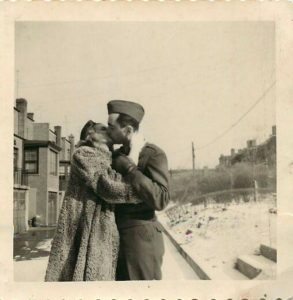
“I don’t,” he said. “I am disappointed when people offer me a seat on a bus or train. I suppose that is an exercise in self-delusion. When I look at my face in the mirror I do not see an old man. However, stark naked in a full-length mirror, I am appalled at the devastation, and the self-delusion is deeply challenged.”
Adler also shared a few stereotypes about growing older—good and bad—that he has found are, indeed, true:
1. That the people you love dearly will be with you in body and mind throughout your lifetime. “The worst experience of my life is having to contend with the mental loss of the love of my life, my wife of 66 years, who is in the grip of dementia. The last chapter of life is filled with horrendous surprises.”
2. That your hearing ability diminishes. “This is true,” he said. “My eyesight has not deteriorated, however.”
3. “The largest organ of your body, the skin, has taken a long beating from the sun and pollution and it shows it,” he acknowledged.
4. That you do need to urinate more frequently at night. “This is true,” he said.
5. That young people treat you as old. “This is generally true.”
 6. That you spend more time with your doctor, and you become a bit of a hypochondriac.
6. That you spend more time with your doctor, and you become a bit of a hypochondriac.
7. That you are often ignored at a cocktail party or gathering by younger people. Not always. “Young writing aspirants love your advice and take your writing achievements very seriously and respectfully,” he said. “Many people ask if I am still writing as if talent and desire become a dead issue at a certain age. When I answer in the positive, people seem surprised.”
8. That you are not regarded as a sex object.
9. That you often remember events, pop culture and movie stars, very famous in your lifetime that are not recognized at all by younger people.
10. That you walk slower than much younger people. “This is true,” he said.
11. That you are concerned mostly about the past and often bore people with your anecdotes about how life was when you were young. Again, this isn’t always the case, however. “Actually I have found keen interest among intelligent and aware young people when I talk about the old days.”
12. That old people exaggerate the importance of their lifelong accomplishments. “I believe I am a prime example of this personal assertion, and I have spent the last 20 years working on that premise based on the belief that my books will stand the test of time,” Adler said. “I am a pioneer in digital publishing which makes it possible to keep my writings in print long after my demise. I am well aware that such an ambition might be illusory, but I am committed to the idea body and soul and have made commitments to sustain that idea financially beyond my lifetime.” (WarrenAdler.com refers to Warren as a pioneer in electronic publishing, stating that he introduced the first viable digital reader manufactured by Sony in 2007. After being published by Viking, Putnam, Crown, William Morrow and Warner Books, the site says he re-acquired his complete backlist and converted his entire library to digital publishing formats, published now under his own company, Stonehouse Productions.

Adler said as he enters the last chapter of his long and prosperous life, he isn’t afraid of death and what comes next. He will continue to endure. “Not afraid,” he said. “Just curious.”
Read Part One here.
This article originally appeared on Forbes here.
The post New Exclusive FORBES Two-Part Series on Warren Adler (Part II) appeared first on Warren Adler.
May 24, 2017
Olivia Kate Cerrone
I began writing stories as a very young child because I loved the places that books took me in my mind. The possibilities of fiction filled me with wonder and hope. As I matured, I began to realize the great social value that stories hold, and how essential the presence of socially-conscious art is in a society. Through language, writing breathes new life into larger expressions of ordinary people’s lives, along with offering deeper, more nuanced insight into complicated histories and difficult social issues. Stories help expand our sense of compassion and understanding of others. They take us to places we might not be able to access otherwise. I wrote The Hunger Saint to understand how a practice as terrible as child labor could be normalized in a society oppressed by severe poverty. How might a twelve-year-old boy escape such a fate? The actress Viola Davis said that as an artist she wishes to “exhume those bodies. Exhume those stories — the stories of the people who dreamed big and never saw those dreams to fruition, people who fell in love and lost.” There is a kind of justice to storytelling, perhaps even a sense of redemption. I hope to offer through my writing a greater understanding of how people are transformed by suffering, and ultimately transcend it.
https://www.oliviacerrone.com/
The post Olivia Kate Cerrone appeared first on Warren Adler.
May 23, 2017
Warren Adler Titles You Can Enjoy for Free on Kindle Unlimited
We Are Holding the President Hostage
 Aging Mafia Don Salvatore Padronelli, a.k.a. the Padre, is furious when fanatical terrorists capture his beloved daughter and grandson on a trip to Egypt. Fed up with diplomatic caution that prolongs their captivity, the Padre and his loyal henchman cleverly insinuate themselves into the White House to hold the President and his wife hostage.
Aging Mafia Don Salvatore Padronelli, a.k.a. the Padre, is furious when fanatical terrorists capture his beloved daughter and grandson on a trip to Egypt. Fed up with diplomatic caution that prolongs their captivity, the Padre and his loyal henchman cleverly insinuate themselves into the White House to hold the President and his wife hostage.
Now the Padre calls the shots on getting the President to take steps to release his family. But will his plan go as expected?
Read It for Free on Kindle Unlimited
Banquet Before Dawn
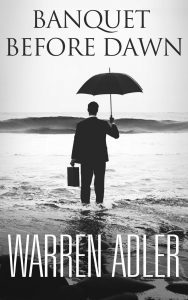 After serving his Brooklyn district for years, Congressman Sullivan discovers that his once comfortable Irish-American majority has given way to a diverse district of blacks and Hispanics. Challenged by a more liberal opponent, he tries everything possible to maintain his seat only to painfully learn that he and his views are outdated and irrelevant to today’s world. But he doesn’t bow out of the race gracefully, and the fierce ensuing campaign brings new insights to the meaning of democracy and the terrors of a swiftly changing world. If, as it is said, all politics are local, this compelling story transcends politics and puts a human face on how the American democratic system really operates. Unforgettable characters and a powerful plot offer a remarkable and tense story of how tragic endings affect new beginnings.
After serving his Brooklyn district for years, Congressman Sullivan discovers that his once comfortable Irish-American majority has given way to a diverse district of blacks and Hispanics. Challenged by a more liberal opponent, he tries everything possible to maintain his seat only to painfully learn that he and his views are outdated and irrelevant to today’s world. But he doesn’t bow out of the race gracefully, and the fierce ensuing campaign brings new insights to the meaning of democracy and the terrors of a swiftly changing world. If, as it is said, all politics are local, this compelling story transcends politics and puts a human face on how the American democratic system really operates. Unforgettable characters and a powerful plot offer a remarkable and tense story of how tragic endings affect new beginnings.
Read It for Free on Kindle Unlimited
Torture Man
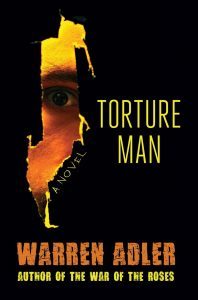 The caller made it clear-$10 million or her daughter’s head. The power of unintended consequences sends the privileged life of prominent anti-war activist Sarah Raab crashing down around her. Fear and terror take hold and Sarah turns to former CIA operative Carl Hellmann, a man she has only just met and who stands against everything she has been fighting for.
The caller made it clear-$10 million or her daughter’s head. The power of unintended consequences sends the privileged life of prominent anti-war activist Sarah Raab crashing down around her. Fear and terror take hold and Sarah turns to former CIA operative Carl Hellmann, a man she has only just met and who stands against everything she has been fighting for.
How could this happen? Why would a terrorist group target her family? Confusion turns to fear and anger as Sarah faces the shocking truth lying beneath the surface of her life. And though Carl’s interrogation methods violate everything Sarah believes in, they may be the only way to save her daughter’s life.
Read It for Free on Kindle Unlimited
Residue
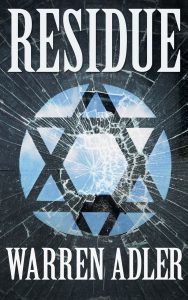 The firebombing of a black church and former synagogue in Brooklyn sets off a chain reaction of international intrigue and bloody violence. The fire bombers are young men of Arab extraction who mistakenly believe that this church—whose stain glass windows illustrate the Stars of David—is still a synagogue.
The firebombing of a black church and former synagogue in Brooklyn sets off a chain reaction of international intrigue and bloody violence. The fire bombers are young men of Arab extraction who mistakenly believe that this church—whose stain glass windows illustrate the Stars of David—is still a synagogue.
In the wake of the bombing, a prominent “white shoe” Wall Street firm sends its young, token Jewish lawyer to help the church pro bono in their insurance claim. However, this charity case takes a sharp turn when the church pastor finds three huge trunks filled with gold and precious jewels worth multimillions in the damaged basement. The bizarre journey of this treasure—where it has come from and how it got in the basement of a black church—produces a ripple effect that draws in people from all walks of life and faith with claims of ownership to its riches. A suspenseful story of terror and greed, Residue illustrates how the long tail of the past can reach into the present with life altering results.
Read It for Free on Kindle Unlimited
Psychological Thrillers
Madeline’s Miracles
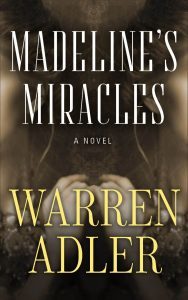 When a commercial artist, her stockbroker husband and their twin daughters move to Los Angeles, they unwittingly fall prey to a woman who convinces them that she is a psychic and can foresee their future. By persuading them that she holds the key to their success and can protect them from the dangers that threaten them, she gradually takes full control over their careers, their parenting, even their sex lives, until they become her willing accomplices. This chilling tale rises to a tense crescendo as the psychic dissects and manipulates the family’s beliefs and paralyzes their will to protect themselves. This classic story of brainwashing offers a cautionary tale for anyone who has lost the ability to question an illogical certainty.
When a commercial artist, her stockbroker husband and their twin daughters move to Los Angeles, they unwittingly fall prey to a woman who convinces them that she is a psychic and can foresee their future. By persuading them that she holds the key to their success and can protect them from the dangers that threaten them, she gradually takes full control over their careers, their parenting, even their sex lives, until they become her willing accomplices. This chilling tale rises to a tense crescendo as the psychic dissects and manipulates the family’s beliefs and paralyzes their will to protect themselves. This classic story of brainwashing offers a cautionary tale for anyone who has lost the ability to question an illogical certainty.
Read It for Free on Kindle Unlimited
Cult
 In the dead of night, Naomi Forman receives a phone call. Barney Harrigan, the man she once loved–now happily married with children–utters, “My wife Charlotte has been captured by the Glories.” What began as a rude interruption of her night becomes a horrifying interruption of her life, as she is unable to ignore Barney’s cry for help.
In the dead of night, Naomi Forman receives a phone call. Barney Harrigan, the man she once loved–now happily married with children–utters, “My wife Charlotte has been captured by the Glories.” What began as a rude interruption of her night becomes a horrifying interruption of her life, as she is unable to ignore Barney’s cry for help.
Drawn into the Glory Church doomsday cult by her estranged sister, Charlotte Harrigan succumbs to the will of the enigmatic Father Glory. Brainwashed beyond comprehension, she is now not herself, but only one of many who have been entrapped by the cult’s promise of rebirth into a new, idyllic life.
Against her better judgment, Naomi agrees to help Barney confront the Glories and save Charlotte. But naïve optimism quickly plummets to misery as their plans are systematically picked apart, dashed by members of the cult past and present, and even by the local Sheriff T. Clausen Moore, who is only as helpful as the Glories want him to be. His awareness of the Glory’s practices and their secluded compound–including the river, where there has been more than one “accidental” drowning–is the one obstacle that he too must overcome to restore order to his county. No one is safe.
Naomi’s will is tested and Barney becomes more and more desperate. The lengths he is willing to go to save his wife are as sinister as the Glories themselves.
From the Manson family to Scientology, cults have been fascinating, disturbing, and terrifying, from their induction methodologies to doomsday imperatives. The Glory Church of Warren Adler’s vision is no different. Just look to the headlines. Their time will come.
Read It for Free on Kindle Unlimited
Natural Enemies
 A young New York couple, unable to have children and whose marriage seems to be sputtering, is advised to leave their tense urban lives and take a vacation in a more bucolic environment. Out West, they are suddenly confronted by violent rednecks and chased deep into the surrounding wilderness. Braving floods, avalanches, wild animals and human predators, they come face-to-face with death. This test of endurance and their passion to survive gives them new insights into themselves and their future together. This gripping, fast-moving, and suspenseful story will hold the reader’s interest until the last turn of the page.
A young New York couple, unable to have children and whose marriage seems to be sputtering, is advised to leave their tense urban lives and take a vacation in a more bucolic environment. Out West, they are suddenly confronted by violent rednecks and chased deep into the surrounding wilderness. Braving floods, avalanches, wild animals and human predators, they come face-to-face with death. This test of endurance and their passion to survive gives them new insights into themselves and their future together. This gripping, fast-moving, and suspenseful story will hold the reader’s interest until the last turn of the page.
Read It for Free on Kindle Unlimited
The Serpent’s Bite
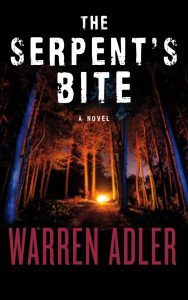 In an attempt to reconnect with his two alienated adult children, George Temple replicates the memorable horse trek through the forbidding Yellowstone wilderness they had enjoyed twenty years earlier. But his callous children, Courtney and Scott, accompany him only to persuade him to restore the financial support he has withdrawn. As they are led by a drunken guide and a venal horse wrangler over potentially lethal terrain, their bonding experience quickly disintegrates.
In an attempt to reconnect with his two alienated adult children, George Temple replicates the memorable horse trek through the forbidding Yellowstone wilderness they had enjoyed twenty years earlier. But his callous children, Courtney and Scott, accompany him only to persuade him to restore the financial support he has withdrawn. As they are led by a drunken guide and a venal horse wrangler over potentially lethal terrain, their bonding experience quickly disintegrates.
Nostalgia is corrupted into a nightmare of lust, betrayal, and entrapment as the children’s disturbing motives are revealed and dark family secrets are exposed. Courtney’s appetite for selfish and violent pursuits establishes her as one of the most evil women in fiction, alongside the likes of Lady Macbeth. Through her, Warren Adler explores how an obsession for celebrity and blind ambition can distort familial love and turn a beloved child into a grotesque monster. As he did in the iconic The War of the Roses, Adler paints a frightening picture of the American family, only more sinister.
Read It for Free on Kindle Unlimited
Treadmill
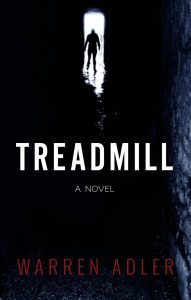 Jack Cooper is an unhappy man—mind, body, and spirit. In the blink of an eye, he has lost his longstanding job to the economy, his mother to illness, and his wife to her secret lover. Beaten, broken, and crippled by tragedy, he withdraws into total isolation, narrowing his life down to the simplest of routines in order to block out the pain. His day begins with a strenuous workout at the Bethesda Health Club, his personal oasis where his mind and body can be free, and ends in his tiny apartment, where he escapes from reality with his books until he can lose himself in sleep. Nothing more, nothing less. That is, until he meets the enigmatic Mike Parrish.
Jack Cooper is an unhappy man—mind, body, and spirit. In the blink of an eye, he has lost his longstanding job to the economy, his mother to illness, and his wife to her secret lover. Beaten, broken, and crippled by tragedy, he withdraws into total isolation, narrowing his life down to the simplest of routines in order to block out the pain. His day begins with a strenuous workout at the Bethesda Health Club, his personal oasis where his mind and body can be free, and ends in his tiny apartment, where he escapes from reality with his books until he can lose himself in sleep. Nothing more, nothing less. That is, until he meets the enigmatic Mike Parrish.
Stolen from the hospital as a newborn and passed around from household to household, Parrish has no official identification. To the government and the world at large, he does not exist. He is an anonymous drifter, but also the first person who breaks through Cooper’s emotional confinement. Cooper finds solace in his friendship with Parrish, a man who understands his plight and is sympathetic to his pain.
But then Parrish suddenly disappears, leaving Cooper to search for a virtually invisible man. As he looks for clues as intangible as ghosts, and chases leads as fleeting as shadows, his search leads him back to the one place he called his refuge: the Bethesda Health Club.
How much can be taken from a man before he has nothing to lose?
Read It for Free on Kindle Unlimited
The Fiona Fitzgerald Mysteries
American Quartet
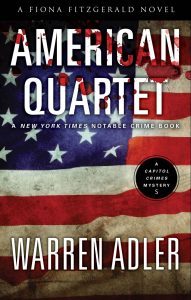 Detective Fiona Fitzgerald is an unlikely force for justice in Washington, D.C.’s predominantly male police force. As a Senator’s daughter and top investigator in the homicide division of the Metropolitan Police Department, Fiona maneuvers between two vastly different worlds, moving quickly from opulent State galas to gritty crime scenes. Born into the elite social circles of the nation’s capital, and armed with intimate knowledge of the true face of the political establishment, Fiona is determined to expose the chicanery concealed within the highest echelons of the American political aristocracy.
Detective Fiona Fitzgerald is an unlikely force for justice in Washington, D.C.’s predominantly male police force. As a Senator’s daughter and top investigator in the homicide division of the Metropolitan Police Department, Fiona maneuvers between two vastly different worlds, moving quickly from opulent State galas to gritty crime scenes. Born into the elite social circles of the nation’s capital, and armed with intimate knowledge of the true face of the political establishment, Fiona is determined to expose the chicanery concealed within the highest echelons of the American political aristocracy.
When a string of inexplicable murders rocks the hallowed streets of central D.C., Fiona finds herself charging through the shadows of a mysterious conspiracy. Faced with an investigation with no leads and a rising body count, Fiona’s reputation as a top investigator is called into question.
At the brink of professional ruin, an encounter with the eccentric yet charismatic Thaddeus Remington III at his museum-like mansion sends Fiona hurtling headlong through a whirlwind of clues. Where once the desperate detective blundered through traceless footsteps of a triple murderer, the answers to her case now seem to be whispered from bloodstained graves of fallen Presidents. Fiona stands ready, her finger on the trigger, as an assassination plot decades in the making is about to change history forever.
Read It for Free on Kindle Unlimited
American Sextet
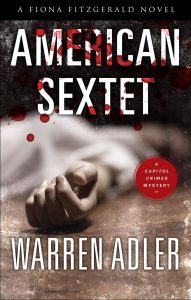 Former Washington Post reporter Jason Martin knows there’s something secretive going on in the high echelons of politics, and he’s determined to find a way to prove it. Beautiful and naïve Dorothy Curtis becomes the key to Jason’s plan, which he hopes will put them both back on track. Can he give the sextet of the most powerful men in Washington an expiration date on their greedy endeavors? When Dorothy’s body is found at the bottom of the Duke Ellington Memorial Bridge, everyone assumes it was suicide over a lover. But Fiona Fitzgerald, a top Metropolitan Police Department detective, has her doubts. Fiona knows that in this town, power and money come before love. Unfortunately, this death hits a little too close to home, and Fiona wrestles with her own feelings about love as she finds herself empathizing with Dorothy. When Fiona and Jason collide, the power lies in the truths they reveal, truths that will bring down the sextet and help them both come to terms with their own demons. American Sextet is the second book in the Fiona Fitzgerald Mystery series.
Former Washington Post reporter Jason Martin knows there’s something secretive going on in the high echelons of politics, and he’s determined to find a way to prove it. Beautiful and naïve Dorothy Curtis becomes the key to Jason’s plan, which he hopes will put them both back on track. Can he give the sextet of the most powerful men in Washington an expiration date on their greedy endeavors? When Dorothy’s body is found at the bottom of the Duke Ellington Memorial Bridge, everyone assumes it was suicide over a lover. But Fiona Fitzgerald, a top Metropolitan Police Department detective, has her doubts. Fiona knows that in this town, power and money come before love. Unfortunately, this death hits a little too close to home, and Fiona wrestles with her own feelings about love as she finds herself empathizing with Dorothy. When Fiona and Jason collide, the power lies in the truths they reveal, truths that will bring down the sextet and help them both come to terms with their own demons. American Sextet is the second book in the Fiona Fitzgerald Mystery series.
Read It for Free on Kindle Unlimited
Death of a Washington Madame
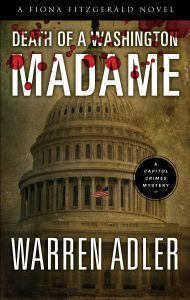 Old money, old secrets. The elderly mother of the Governor of Virginia, an icon of Washington society, is found dead and sexually assaulted in her posh Washington, DC, residence. Metropolitan Police detective Fiona Fitzgerald investigates the horrifying crime. As a senator’s daughter, she has the advantage of knowing the world of Washington’s privileged.
Old money, old secrets. The elderly mother of the Governor of Virginia, an icon of Washington society, is found dead and sexually assaulted in her posh Washington, DC, residence. Metropolitan Police detective Fiona Fitzgerald investigates the horrifying crime. As a senator’s daughter, she has the advantage of knowing the world of Washington’s privileged.
Young Martine, the accused, has no advantages. He was not raised in a family with political leverage and does not understand the inner-workings and secrets of Washington’s politicians. Then there is the devoted servant, the status-hungry daughter-in-law, the drugs, power, and money—but where does the truth lie within this complicated family drama?
Through it all, Fiona wrestles with her own feelings about marriage as she considers marriage to a former general, who is now mounting a massive offensive for her hand. Will an inside look at one Washington marriage—and all of its dirty little secrets—help her choose? Fiona must battle both privilege and prejudice as she uncovers the inevitable truth behind the political facade.
Read It for Free on Kindle Unlimited
Immaculate Deception
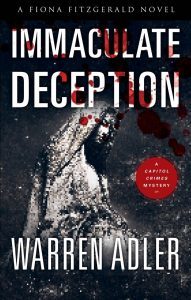 When an outspoken pro-life congresswoman is found dead, there isn’t enough evidence to point to the congresswoman’s death as a suicide, as everyone thinks. There is something just too perfect about the life of Frances “Frankie” McGuire—mother, Irish Catholic congresswoman from Boston.
When an outspoken pro-life congresswoman is found dead, there isn’t enough evidence to point to the congresswoman’s death as a suicide, as everyone thinks. There is something just too perfect about the life of Frances “Frankie” McGuire—mother, Irish Catholic congresswoman from Boston.
Sergeant Fiona Fitzgerald, daughter of a Senator, takes nothing at face value, especially when politics are involved. Everyone in Washington has a secret, and the senator’s personal world turns out to be much more complicated than anyone ever knew. A pregnancy, an estranged husband, a mistress, and the fragility of life—both wanted and unwanted—collide, leaving Fiona to sort out the consequences of the messy case. Fiona faces the issues of abortion and women’s rights just as she is contemplating her own pregnancy, with or without a steady man in her life.
Read It for Free on Kindle Unlimited
Senator Love
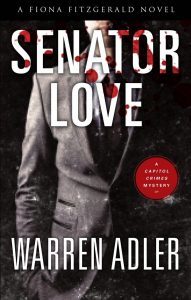 For Metropolitan Police detective Fiona Fitzgerald, the mysterious case of the Austrian ambassador’s beautiful wife’s death is a stark reminder of her upbringing. High-class soirees, men with power, and bored political wives are abundant in this high-profile case. Underneath it all, Fiona understands the publicity nightmare for the Washington elite—and the lengths they will go to for damage control in order to protect their hallowed reputations.
For Metropolitan Police detective Fiona Fitzgerald, the mysterious case of the Austrian ambassador’s beautiful wife’s death is a stark reminder of her upbringing. High-class soirees, men with power, and bored political wives are abundant in this high-profile case. Underneath it all, Fiona understands the publicity nightmare for the Washington elite—and the lengths they will go to for damage control in order to protect their hallowed reputations.
At the center is Florida Senator Sam Langford. He’s smart, attractive, and a well-known philanderer with his sights set on the presidency. When the bones of a young woman are discovered, the clues and the similarities begin to make sense and they all point to the seductive and powerful senator. Reluctantly vulnerable to the Senator’s charms herself, Fiona finds herself in too deep. Fiona thinks she understands the world she is investigating—but does she?
Read It for Free on Kindle Unlimited
The Ties That Bind
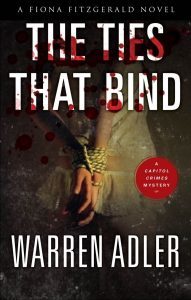 Rumors are abuzz at the Supreme Court that an associate justice has a not-so-secret sadomasochistic fetish. When Metropolitan Police detective Fiona Fitzgerald is called in to investigate the city’s latest gruesome murder that involves S&M, she is forced to look at these rumors—and face her own painful memories.
Rumors are abuzz at the Supreme Court that an associate justice has a not-so-secret sadomasochistic fetish. When Metropolitan Police detective Fiona Fitzgerald is called in to investigate the city’s latest gruesome murder that involves S&M, she is forced to look at these rumors—and face her own painful memories.
But when Fiona discovers a connection between an old acquaintance and the dead girl, she is determined to prove that the secrets of sexual aberration and the fear of exposure are the driving factors of this murder. As her personal drive to make peace with her past collides with criminal sexual conduct, Fiona finds herself in harm’s way. Is her desire for revenge impairing the investigation?
Read It for Free on Kindle Unlimited
The Witch of Watergate
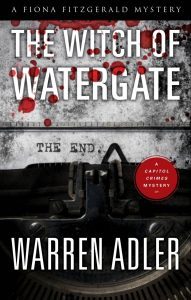 The poison pen of Polly Dearborn, an infamous Washington Post investigative reporter, has gone silent. When Polly is found hanging from her balcony in the Watergate apartments, Washington’s elite and powerful rejoice—the Witch of Watergate is dead! But Polly’s voice reaches beyond the grave, and her final articles may contain clues to some big secrets.
The poison pen of Polly Dearborn, an infamous Washington Post investigative reporter, has gone silent. When Polly is found hanging from her balcony in the Watergate apartments, Washington’s elite and powerful rejoice—the Witch of Watergate is dead! But Polly’s voice reaches beyond the grave, and her final articles may contain clues to some big secrets.
Homicide detective Fiona Fitzgerald, well-versed in the behind-the-scenes dealings of Washington, doesn’t buy the suicide angle. But secret alliances between the police, the Post, and the mayor are making Fiona’s job difficult. What’s worse is that her new and unlikable partner, Charleen Evans, seems to be working against Fiona when she takes control of the evidence herself. All challenges aside, Fiona knows the political world and is determined to find the truth.
Read It for Free on Kindle Unlimited
Washington Masquerade
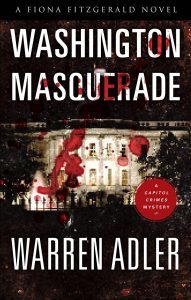 Adam Burns, Washington Post columnist and controversial presidential critic, is dead. With no clear circumstances, speculation, gossip, and rumor flood the media—was it accident, suicide, or murder? Conspiracy theories run amok, accusing none other than the President of the United States. Was Adam Burns the target of a government hit squad? Did someone decide to silence his diatribes once and for all? Fiona Fitzgerald, an unlikely hero in Washington D.C.’s blue-collar, predominantly male police force, is entrusted with unraveling Burns’ death.
Adam Burns, Washington Post columnist and controversial presidential critic, is dead. With no clear circumstances, speculation, gossip, and rumor flood the media—was it accident, suicide, or murder? Conspiracy theories run amok, accusing none other than the President of the United States. Was Adam Burns the target of a government hit squad? Did someone decide to silence his diatribes once and for all? Fiona Fitzgerald, an unlikely hero in Washington D.C.’s blue-collar, predominantly male police force, is entrusted with unraveling Burns’ death.
Born into the elite social circles of the nation’s capital, and with privileged access to what lurks behind the pristine façade of the political establishment, Fiona is determined to expose the chicanery buried under prim rose bushes and concealed within the ceaseless Washington Masquerade. Days roar by—pressure mounts—clues mislead—intuition betrays. Can Fiona clear the President’s name? Is one woman enough to stop a nation out for blood.
Read It for Free on Kindle Unlimited
Red Herring
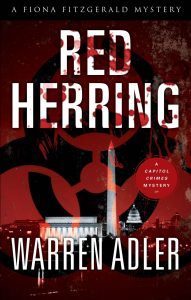 Detective Fiona Fitzgerald’s privileged upbringing in the nation’s capital and her intimate knowledge of its inner workings come in handy when Fran Miller, a top lobbyist and legal expert, turns up dead on Independence Day. It looks like suicide, but when the clues lead back to Mark Chancellor, the husband of Fiona’s best friend, things gets complicated.
Detective Fiona Fitzgerald’s privileged upbringing in the nation’s capital and her intimate knowledge of its inner workings come in handy when Fran Miller, a top lobbyist and legal expert, turns up dead on Independence Day. It looks like suicide, but when the clues lead back to Mark Chancellor, the husband of Fiona’s best friend, things gets complicated.
Chancellor runs a complex, global conglomerate, and along with his Russian partner, is involved in the pharmaceutical and defense industries. Chancellor is at the top of his game, well-connected in Washington and known to believe that money is the planet’s most powerful weapon.
But uncovered secrets reveal that terrorist affiliates may have something more powerful: biological weapons. While the high-stakes players behind the scenes are trying to avoid a potential worldwide catastrophe, the race to find an antidote is complicated by deception and corruption, and now maybe by death.
Rumors swirl about the dead lobbyist: a mysterious lover, millions of dollars hidden in small-town Virginia, and what looks like a recent vaccination on her upper right arm. But did someone target Fran? After all, she knew more about biological and chemical weapons than almost anyone. Was she caught up in the convoluted web of international biological warfare?
Coincidence, luck, and a little passion give Fiona a labyrinth of leads to follow. But sometimes the simple truth is harder to see.
Read It for Free on Kindle Unlimited
Mystery
Flanagan’s Dolls
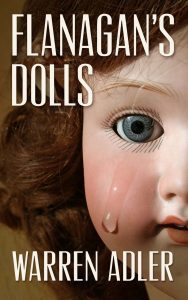 Josh and Emily Flanagan return to their hometown in upper Michigan where they open a funky antique shop which they hope will provide a sane and comfortable retirement. Both have pursued successful careers in Manhattan, she as an appraiser of antiques for an auction house, and he as an insurance adjuster in the field of art and antiques. But when a man arrives seeking to purchase an antique doll for his ailing grandchild, the Flanagans unintentionally open up a Pandora’s Box of hidden family secrets and intrigue that results in bitter hostility and murder. Josh and Emily, through brilliant deduction and imaginative enterprise discover the clues that lead to the solution that lies at the heart of this mystery.
Josh and Emily Flanagan return to their hometown in upper Michigan where they open a funky antique shop which they hope will provide a sane and comfortable retirement. Both have pursued successful careers in Manhattan, she as an appraiser of antiques for an auction house, and he as an insurance adjuster in the field of art and antiques. But when a man arrives seeking to purchase an antique doll for his ailing grandchild, the Flanagans unintentionally open up a Pandora’s Box of hidden family secrets and intrigue that results in bitter hostility and murder. Josh and Emily, through brilliant deduction and imaginative enterprise discover the clues that lead to the solution that lies at the heart of this mystery.
Read It for Free on Kindle Unlimited
Romance
Private Lies
 Ken Kramer and his wife, Maggie, appear to have a comfortable life and loving marriage. But their peaceful life is shattered when Ken is taken along on a business dinner and introduced to Maggie’s major client, Eliot, and his wife, Carol—who happens to be Ken’s old flame. Though Carol was once the love of his life and the object of his sexual obsession as a young man, the Carol he meets seems determined to not recognize him at the dinner table. Baffled by her non-recognition, he learns that she has totally reinvented herself and snagged a rich husband who has no knowledge of her real early life. As Maggie and Eliot grow closer, the love and sexual obsession between Ken and Carol rekindles—only for the plot to thicken as both couples embark on an African Safari with startling and tragic results.
Ken Kramer and his wife, Maggie, appear to have a comfortable life and loving marriage. But their peaceful life is shattered when Ken is taken along on a business dinner and introduced to Maggie’s major client, Eliot, and his wife, Carol—who happens to be Ken’s old flame. Though Carol was once the love of his life and the object of his sexual obsession as a young man, the Carol he meets seems determined to not recognize him at the dinner table. Baffled by her non-recognition, he learns that she has totally reinvented herself and snagged a rich husband who has no knowledge of her real early life. As Maggie and Eliot grow closer, the love and sexual obsession between Ken and Carol rekindles—only for the plot to thicken as both couples embark on an African Safari with startling and tragic results.
Read It for Free on Kindle Unlimited
Mourning Glory
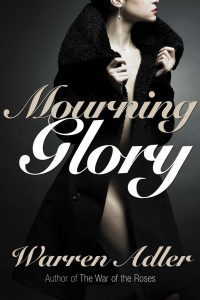 Grace Sorentino has never known the good life: from childhood hardships, to a marriage that began with lofty dreams and ended with all hopes shattered, Grace Sorentino has been dealt bad hand after bad hand. Grace and Jackie, her rebellious teenage daughter, are now stuck in Florida, on the verge of poverty. Grace works as an underpaid and under appreciated cosmetician at Saks Fifth Avenue, and Jackie—when she is not spending her time with questionable boys—balances school and two jobs. Just when Grace believes that things couldn’t get any worse, she is fired after accidentally insulting a snobby customer. However, it is a blessing in disguise. As Grace walks out the door, her boss offers her an invaluable piece of advice: don’t look for a new job, but a vulnerable old rich widower who has just lost his wife; comfort him, and once his guard is down, seduce him. The keys to success and fortune are not a nametag and uniform, but a new last name and a ring on your finger. Marriage should be the number-one priority. At first Grace is appalled by the idea, but as rent, car payments, and credit card bills pile up, her despair turns to desperation. She begins looking through the obituaries for her last chance at a good life—after all, isn’t that something everyone deserves?
Grace Sorentino has never known the good life: from childhood hardships, to a marriage that began with lofty dreams and ended with all hopes shattered, Grace Sorentino has been dealt bad hand after bad hand. Grace and Jackie, her rebellious teenage daughter, are now stuck in Florida, on the verge of poverty. Grace works as an underpaid and under appreciated cosmetician at Saks Fifth Avenue, and Jackie—when she is not spending her time with questionable boys—balances school and two jobs. Just when Grace believes that things couldn’t get any worse, she is fired after accidentally insulting a snobby customer. However, it is a blessing in disguise. As Grace walks out the door, her boss offers her an invaluable piece of advice: don’t look for a new job, but a vulnerable old rich widower who has just lost his wife; comfort him, and once his guard is down, seduce him. The keys to success and fortune are not a nametag and uniform, but a new last name and a ring on your finger. Marriage should be the number-one priority. At first Grace is appalled by the idea, but as rent, car payments, and credit card bills pile up, her despair turns to desperation. She begins looking through the obituaries for her last chance at a good life—after all, isn’t that something everyone deserves?
Read It for Free on Kindle Unlimited
Family Drama
Twilight Child
 In Twilight Child, the rights of grandparents to visit their beloved grandson pit them against their remarried daughter-in-law.
In Twilight Child, the rights of grandparents to visit their beloved grandson pit them against their remarried daughter-in-law.
When Charlie and Molly’s son dies, their daughter-in-law remarries and is vaulted into an upper class world of money and privilege. She is now determined to lead a new life and keep her son free from the blue-collar influences of her ex in-laws. Forced to sue for their right to visit their beloved grandson, Charlie and Molly enter a world of courtroom conflict that deeply affects everyone involved, including the trial judge. Each of the players in this remarkable drama must search their souls for the right decision, not for themselves, but in the best interest of the child whom they all deeply cherish. Topical and utterly devastating, this novel, originally a Reader’s Digest book, delves deeply into the heart-rending dilemma of generational conflict.
Read It for Free on Kindle Unlimited
The post Warren Adler Titles You Can Enjoy for Free on Kindle Unlimited appeared first on Warren Adler.
May 17, 2017
Rowan Hisayo Buchanan
I was a very shy child, as I suppose many writers are. I had a great fear of being misunderstood. My thoughts expressed aloud always sounded strange. This wasn’t helped by the fact that I read a lot and used words that surprised both children and teachers. So, I’d pause before speaking and often, end up saying nothing at all. Or, I’d begin but give up half way through, trailing into silence.
Slowly, I turned these unsaid thoughts into stories. Hesitantly, I showed these stories to certain friends and teachers. Some said they’d felt the exact thing that I’d had. This was a surprise.
Hemingway advised, Write the truest sentence that you know. I wrote down all the true things I knew and put them into a novel. The story was fictional. But the emotions, the way a man laughed, the click of a bicycle wheel, and the way paint bubbled on a wall were stolen from life. Writing will, I think, always be a way of trying to sort out my strange true things.
The post Rowan Hisayo Buchanan appeared first on Warren Adler.
May 12, 2017
Top Mother’s Day Reads from Warren Adler
The post Top Mother’s Day Reads from Warren Adler appeared first on Warren Adler.
May 10, 2017
Rhys Bowen
Why do I write? If I didn’t I’d have to clean the house and play bridge, both of which I hate. But seriously I write because I have to write. I have always written and can’t imagine not doing it. I told myself stories as a small child. I wrote movie scripts for myself when I planned to be a movie star as a teenager. And I have been a professional writer since I left college. I have more ideas than I will ever complete in my lifetime. When I finish a book I always plan to not write for a while but after a week I can’t wait to start a new project. I suppose I like visiting other places, other times, living vicariously through my characters.
When I am writing I am lost in that world to the extent that if it is summer in California but snowing in New York in my book, I complain of being cold.
Rhys Bowen is the New York Times bestselling author of two historical mystery series and the #1 Kindle bestseller In Farleigh Field.
The post Rhys Bowen appeared first on Warren Adler.
May 3, 2017
Katie Bayerl
I didn’t start out as a writer. I wasn’t that kid who dreams of holding her own novel one day. I was a voracious reader, though, and I loved being around young people, so I found my way into a career as a teacher. I thrived on those moments when one of my students discovered a book that connected. Being “on” ten hours a day was probably a bad idea for a person with my emotional makeup, though, and the anger I harbored against a system that treated my students as disposable took a serious toll. I left teaching abruptly. It was awful. Also, brave.
During my recovery, I caught a movie version of one of my favorite young adult novels (Speak by Laurie Halse Anderson) on late-night TV. Something clicked: teens and books, my two great loves. I needed to be writing books for teens! I outlined my first young adult manuscript that night.
I now teach part-time in addition to my work as a young adult author. It’s a much better mix. In my own books, I explore personal themes and ideas, but I also get to be part of all of these other young writers’ stories. I can only write so many books in my lifetime, but I can also be part of bringing powerful, diverse new voices into the world. That feels like the perfect place to be.
The post Katie Bayerl appeared first on Warren Adler.
April 26, 2017
Top 7 Things I Keep in Mind When Writing Historical Fiction
I’ve always considered myself a history buff and have written quite a few historical fiction novels requiring exhaustive amounts of research. Creating believable historical fiction means getting facts straight and making sure that your research and imaginative input inspires the most plausible, complex plots and characters you can possibly bring to life. Here I lay out the top 7 components you need to think about when writing historical fiction.
1. Research, Research, Research
Writing historical fiction can be intimidating and you might feel either overwhelmed by the amount of research that is required or constrained by the time period, in turn making your writing flat and boring. If you haven’t done enough research for your novel then it will be evident to readers – the environment you create just won’t have that pull. Doing enough research doesn’t just mean reading up on dates and public figures but delving completely into the historical period you’re writing about. My most popular historical fiction novel, Target Churchill, centers on a fictionalized Soviet conspiracy to assassinate Churchill in order to prevent him from delivering his “Iron Curtain” speech in Fulton, Mo., in 1946. I co-authored the novel with the Pulitzer-Prize nominated Churchill Biographer James C. Humes and spent months reading Winston Churchill’s memoirs, accounts of the events leading up to the Iron Curtain speech; composing his speech in the British embassy in Washington; facts about Soviet spies who had penetrated the embassy during the war; the relationship between Churchill and his lone bodyguard. Walter H. Thompson; details of the Soviet advance into Berlin; events surrounding Truman’s invitation to Churchill to speak at Westminster College in Missouri; the marvelous, true events about the famous poker game on the Presidential train en route to Missouri; and the Churchill family history at the time. It was all grist for the novelist’s mill. My research led to new characters and sub-plots. It was all so rich and intriguing that I could have spent a lifetime on the topic. That research was immensely critical in being able to paint a believable character replete with identifiable insecurities, quirks, strength and weaknesses.
 2. Creating Empathy Through Nuanced, Three-Dimensional Characters
2. Creating Empathy Through Nuanced, Three-Dimensional Characters
The themes in my novels deal primarily with intimate human relationships, the mysterious nature of love and attraction, the fragile relationships between husbands and wives and parents and children, the corrupting power of money, the aging process and other important universal themes that cross cultural boundaries. When writing historical fiction you should always be sure to paint the emotional landscape of your characters within the realities of their specific historical time periods but, most importantly, never lose sight of the fact that the figures you are writing about are human beings plagued with the very same range of complicated human emotions we experience today. As in all good fictional writing, historical figures must be believable. Beyond facts, having the sensitivity to imagine characters in a realistic, emotionally authentic way goes a far way.
My expectation as an author is that exposition, dialogue, character interaction, emotional contact, descriptive details of the environment, authorial insights, and perhaps a sketchy outline of the characters’ physiognomy are all enough to create an image of a character in the reader’s mind. The reader should be well aware of the approximate age of the characters by their impulses and desires, especially in those stories that deal with the mysteries of physical love and motivational impulses like ambition, faith, rapaciousness, depression, yearning and other emotions.
3. Being Genuinely Passionate About the Historical Period and Figures You’re Writing About
What made writing Target Churchill so enjoyable for me is the fact that I am truly a fan of Winston Churchill. I have indelible memories of his speeches, particularly the “Blood, Toil, Sweat and Tears” speech that I heard sitting in my grandparents’ back porch in 1940 after the British retreat on the mainland of Europe. I also remember listening to the Iron Curtain Speech he made in Missouri in 1946. These speeches were an inspiration and moved me immensely. I will never forget them. Churchill is a hero of mine and my biggest goal in rendering his character for the novel was to make him a thoroughly relatable character to readers of today, bringing the more abstract aspects of his humanity to the forefront.
4. Making the Most Out of the Logistical Details in Your Story
Readers want to come away from your work feeling that they’ve learned something new about a particular place and the people living in it. On this front, accuracy is extremely important but you still have room for imagination. I was extremely taken by everything I learned about Russian train engineering when I wrote Trans-Siberian Express but particularly fascinated by the importance of train arrival and departure times to conductors and personnel aboard the Trans-Siberian Express. Much of the interaction of the characters in the story are directly linked to the logistics of timing. Alluding to just one particular aspect of something within your story, in this case, the logistics of train schedules, can offer clever commentary on a society:
That’s the thing about Russian trains. Always on time, to the minute. It’s astonishing, considering the Russians’ lack of efficiency everywhere else.” He flushed suddenly, remembering Mrs. Valentinova
5. Picking Up On the Smallest Details of an Environment Have the Biggest Impact
Evoking the right ambiance in your story means the world when you’re attempting to transport readers into a particular historical period. The more minute the detail, the stronger the impact. Take, for example, this description of Cairo:
Gas fumes permeated everything, and a saffron-coated chickpea stink laced with vague odors of human waste larded the air. A single inhalation, and it could be tasted like some noxious medicinal brew. He was now digesting Cairo, and it lay like lead in his gut.
6. Seamlessly Blending Fact & Fiction
One comment I often receive from readers regarding my historical novel deals with the topic of differentiating fact from fiction. Historical fiction superimposes an imaginative scenario on historical facts and gives imaginary life to real characters while following the course of their reasonably historically accurate lives. Some are taken by the seamless blending of those two worlds and others are confused. I’ve received a countless number of reviews on this topic but one stuck out to me the most for my most recent novel, Mother Nile: “When presented with a story that includes real historical figures and that is set against a backdrop of true historical events, I am always curious to get some sense of where fact ends and fiction begins.” This reviewer suggested using an author’s note that would place my version of events into historical perspective. This is a decision individual authors must make for themselves but I’ve always believed that people who exist in the imagination are just as real as people who exist in the flesh – historical fiction, indeed any kind of fiction, is an exercise in skillfully creating a parallel world where fact and fantasy are fused in a believable way.
7. Avoid Distracting Readers From the Core Plot of the Novel
Although research is paramount to writing high-caliber historical fiction one of the most insidious risks you run is unconsciously allowing technical details to overtake the imaginary plot at the heart of your story. When you’re passionate about the facts you’ve discovered in your research it’s easy to get caught up in placing them all into your work. It’s extremely difficult to decide when to make sacrifices and the trouble here lay in figuring out a way to create a historically accurate cultural landscape while not distracting the reader from the central fictional plot. I wrote Trans-Siberian Express way before the advent of Google and at that time I pretty much haunted the Library of Congress learning as much as I possibly could about Russian train engineering. I had a great time feverishly researching everything I could for that novel but ended up in a situation with my then editor who decided it was best to cut out the majority of the facts I believed to be necessary to the story. Although I was furious at the time, in retrospect, he may well have been right in doing what he did. We all have blind spots. Make sure you’re thinking about your work as objectively as possible.
For a limited time Trans-Siberian Express, Mother Nile, and Target Churchill are only $1.99.

The post Top 7 Things I Keep in Mind When Writing Historical Fiction appeared first on Warren Adler.
A.J. Banner
I can’t explain why I write. I won’t try to be eloquent or clever about my compulsion to do what I do. I’ve simply always had the indefinable impulse to put my thoughts, feelings, and impressions on paper, from the time I could pick up a crayon. Maybe I inherited writing genes from my maternal grandmother, who was an English author living in India. Or maybe creativity comes from some other mysterious place. I’ll never know. In elementary school, I wrote short stories influenced by the authors I read: Tolkien, Agatha Christie, C.S. Lewis, Enid Blyton, and more. When I got my first typewriter, I felt immeasurable satisfaction when I filled the blank space with words. I loved the clacking sounds of the keys hitting the page. I loved the scratching of pen on paper. When I was eight, on a family trip back to India – I was born in Bengal and we had emigrated to Canada – I wrote a vignette about a lost dog on a beach in Puri, in the state of Odisha. At eleven, I started keeping a journal after reading The Diary of Anne Frank. Every day my entry began with Dear Wilma… and the rest is history.
http://ajbanner.com/
The post A.J. Banner appeared first on Warren Adler.
April 19, 2017
Lorna Gibb
When I was young, our Scottish council estate was worst in the winter months. The lack of sunlight, just a few hours a day, meant that days were short, and night time was always a worry because of the sectarian violence that would break out at odd times, between people you hadn’t even known didn’t get on. But our home was a warm one, a loving one, and there were books in every room. Dad loved Steinbeck and Bradbury. Mum loved biographies, especially of the movie stars that had been the escape for her own youth. And so, like them, I read my way out of the drabness, into worlds far worse than mine, or places far more beautiful. Then I began creating my own. I had a predilection for fantastic tales, but also of pretending to be famous historical people and writing imaginary diaries. Writing didn’t seem a way to make a living then, not with any surety. So I studied and found that I loved teaching at University, and kept writing anyway, academic writing that my heart wasn’t in and which didn’t have the magic of the other work I did, at night or early in the morning, my guilty pleasure, my adult escape, as reading had been my childhood one.
But then I sold a book. The money wasn’t enough to live on but I was a professional writer at last. Then another, then a novel, A Ghost’s Story. The story of Katie King had intrigued me for years. A famous 19th century figure, turning up at séances all over the world. The widowed congressman Robert Dale Owen was a victim of a cruel hoax and fell in love with the spirit who came to him night after night. He was committed to an insane asylum, an illustrious philanthropic career ended in madness, for a ghost who didn’t exist. I weaved the Katie King stories, and the John King ones too, a male version of the ghost, originating in Ohio, who went on to become the toast of London society, together in the book. Of course it was about trickery and deception, but also about illusion and the longing to believe. A book about what books are made of, with fake references and real ones, because books both give us knowledge and deceive us, a biography of someone who never existed, a book that hopefully makes the reader question what is real and what is not. My apologetic homage to the reading and writing that had made my illusions and dreams for me. Now I’m working on a non-fiction book. After that, who knows where the words will take me.
The post Lorna Gibb appeared first on Warren Adler.
Warren Adler's Blog
- Warren Adler's profile
- 111 followers



